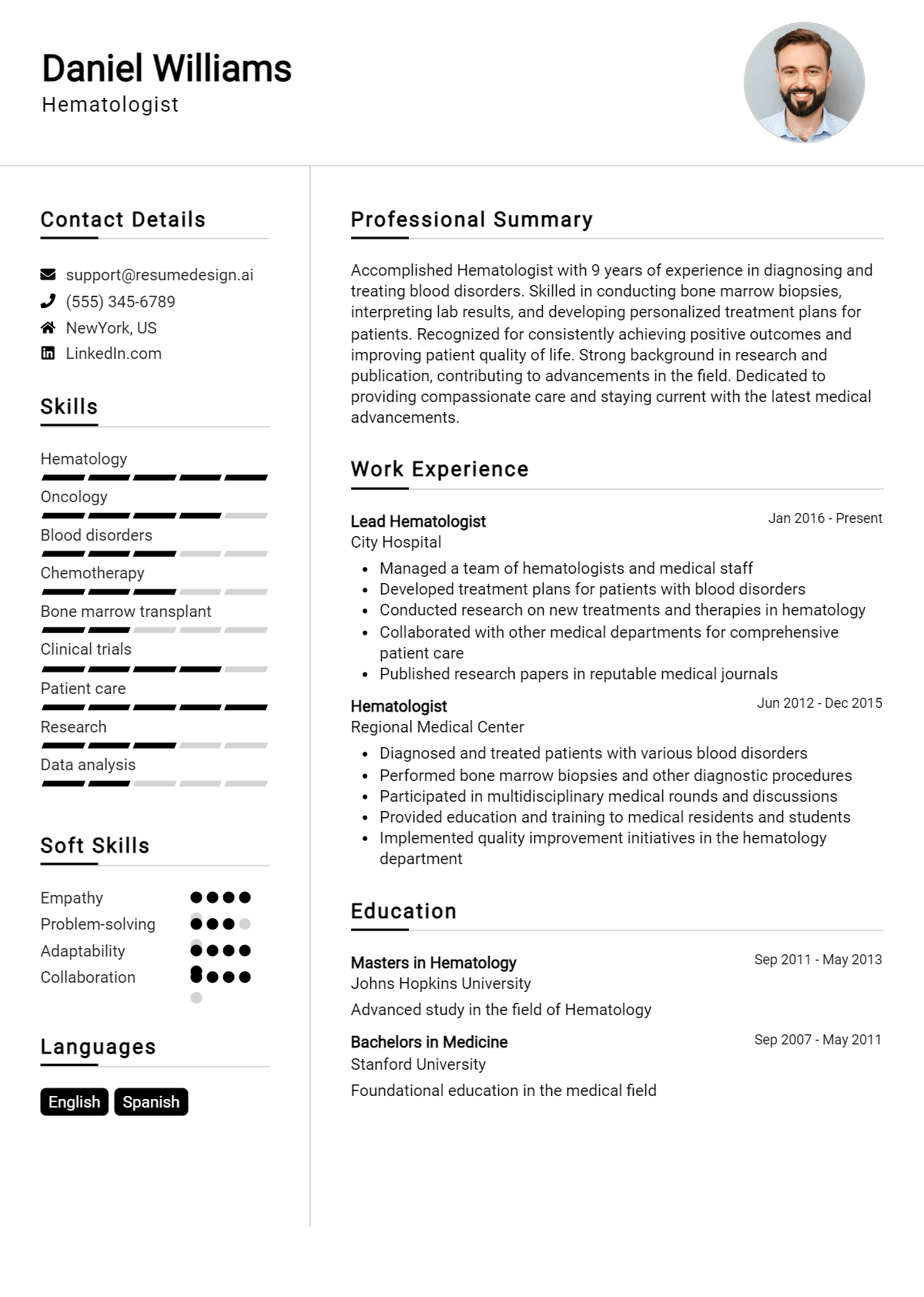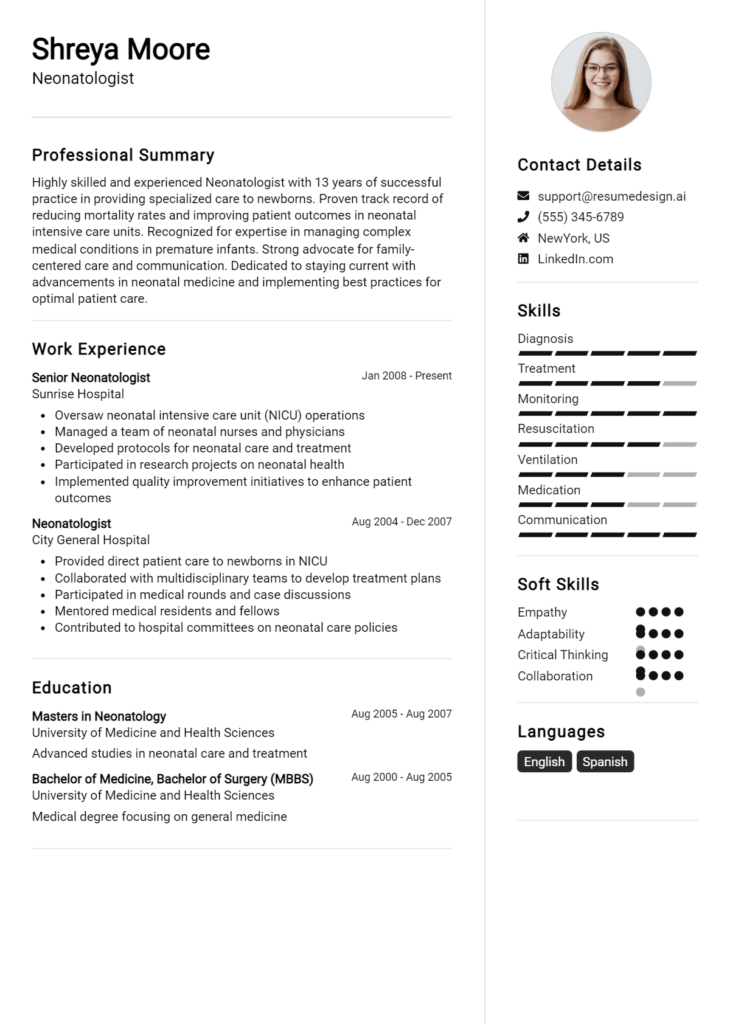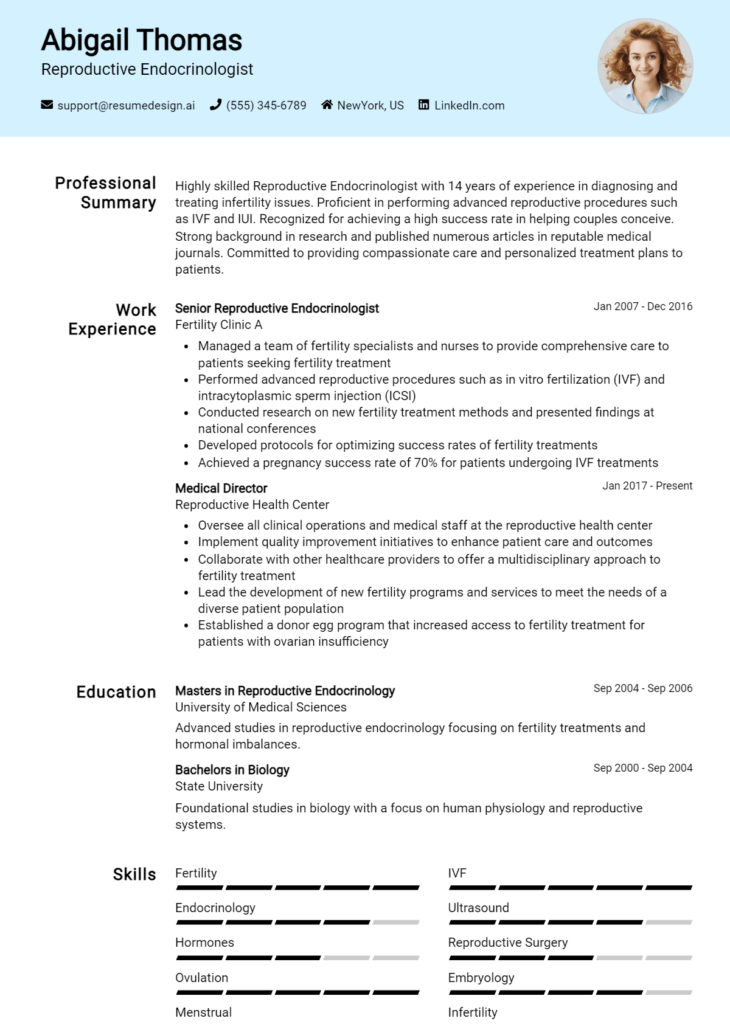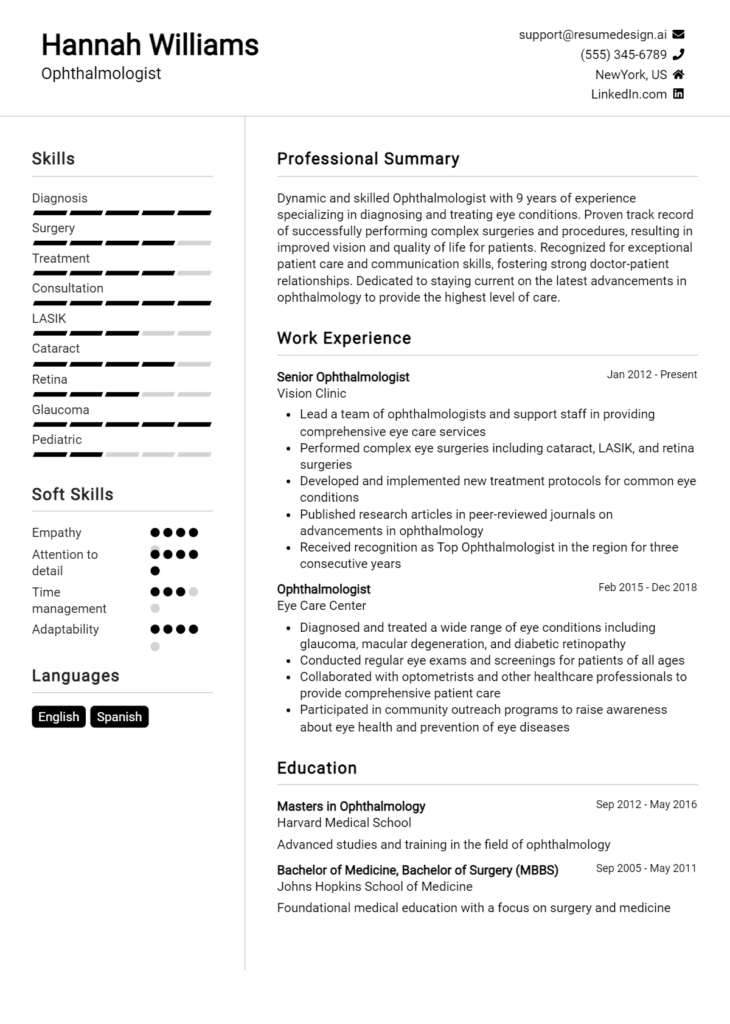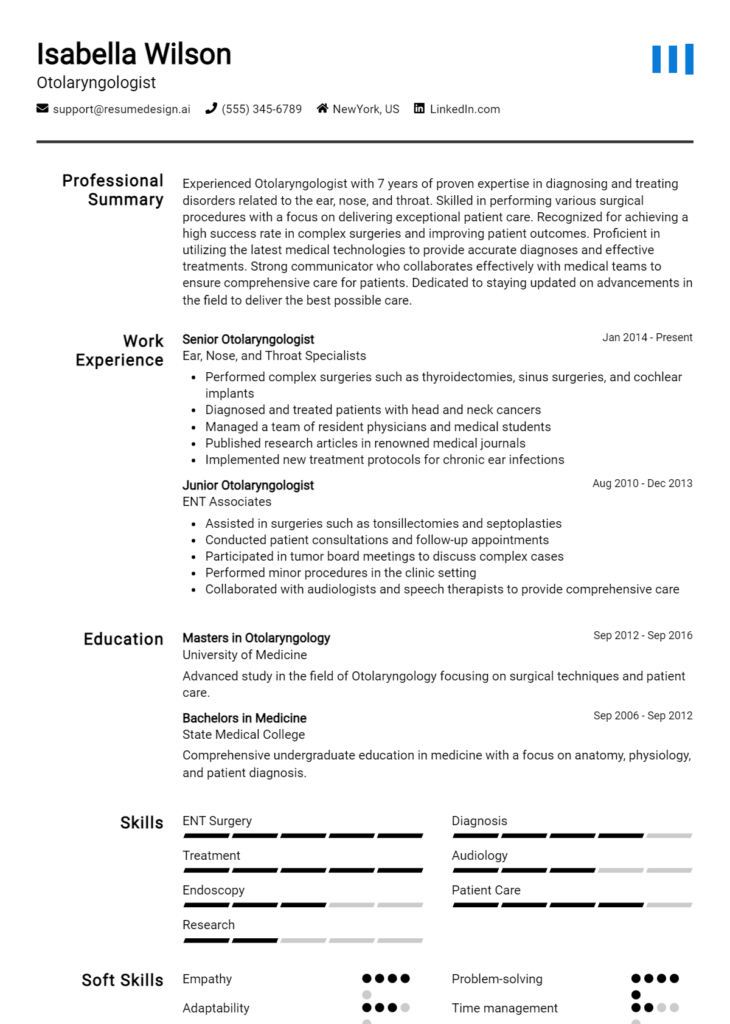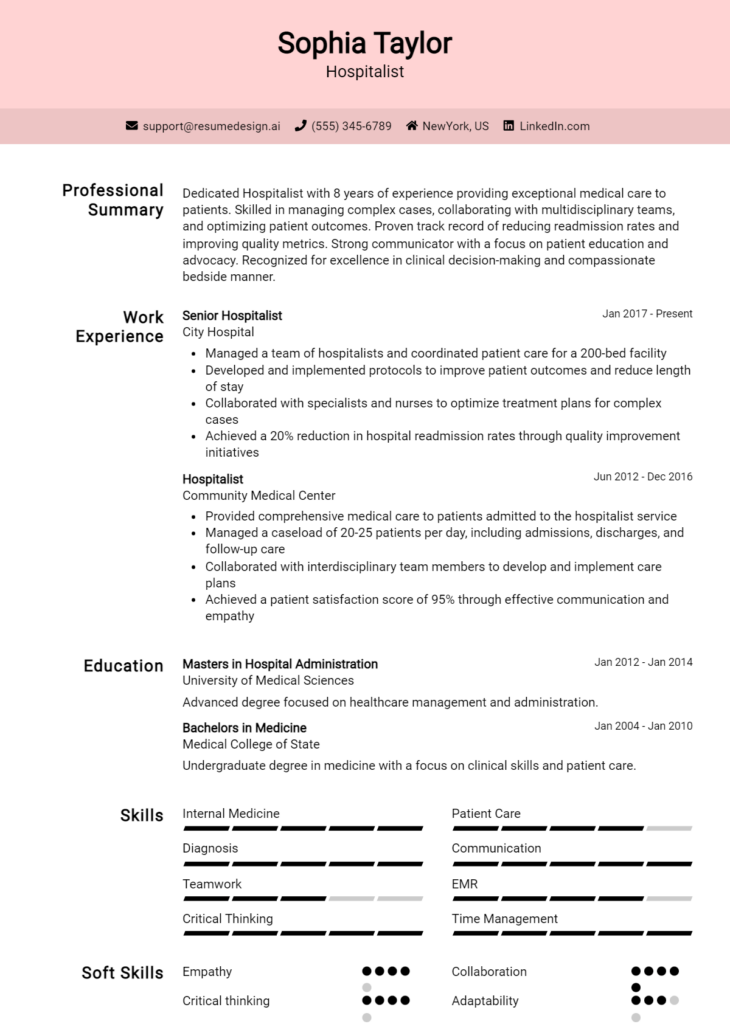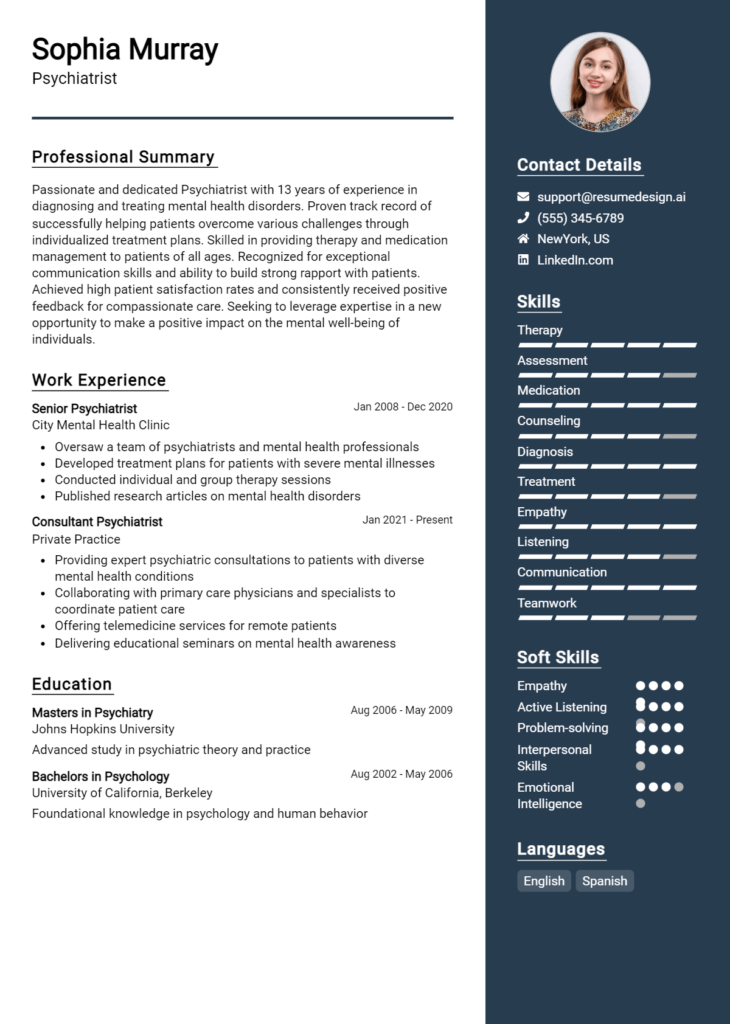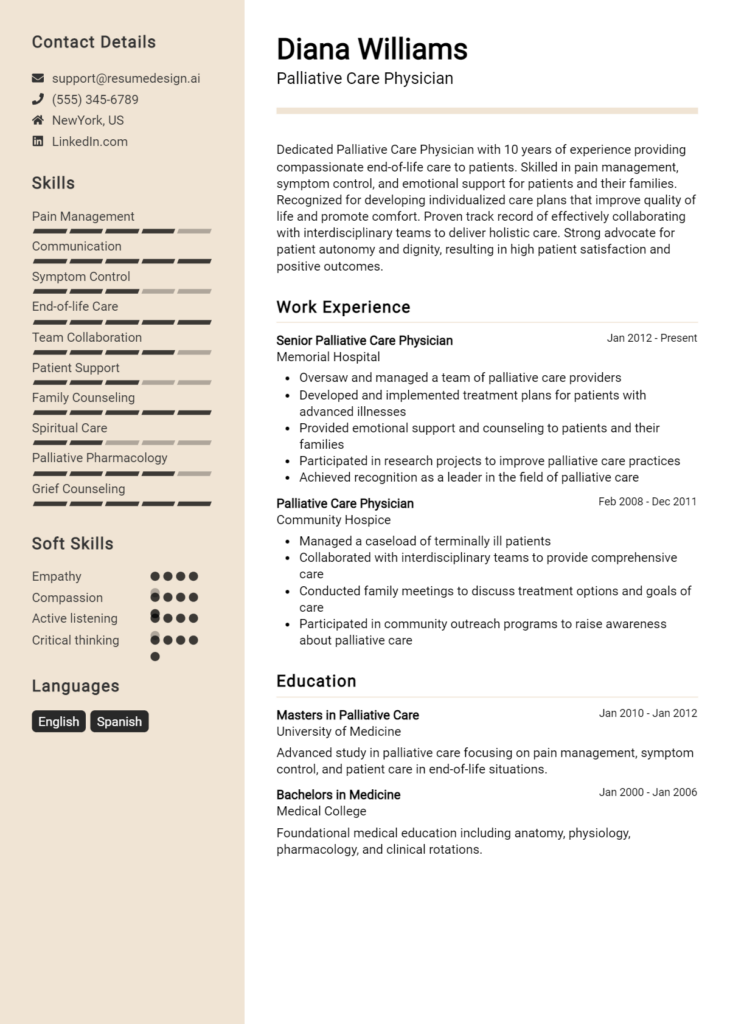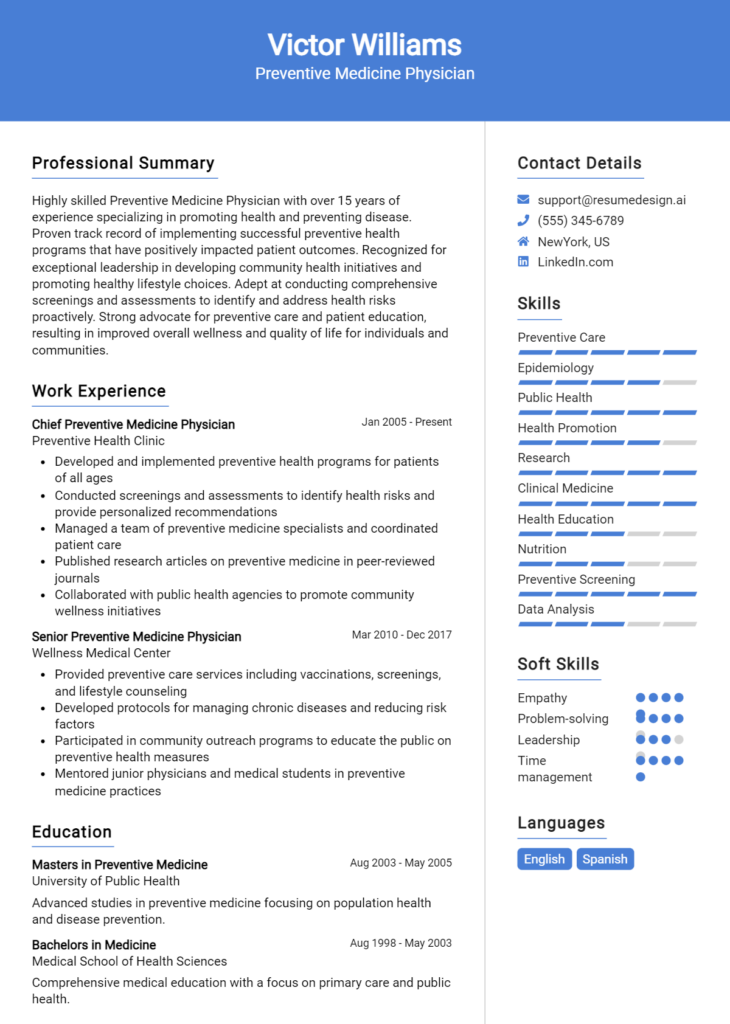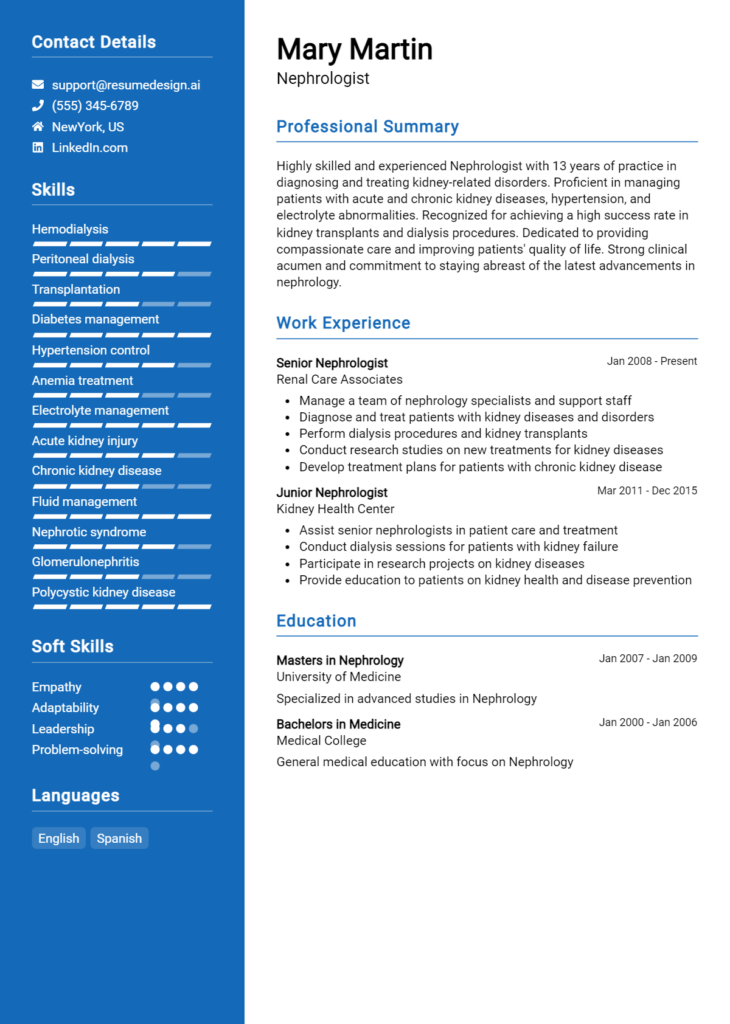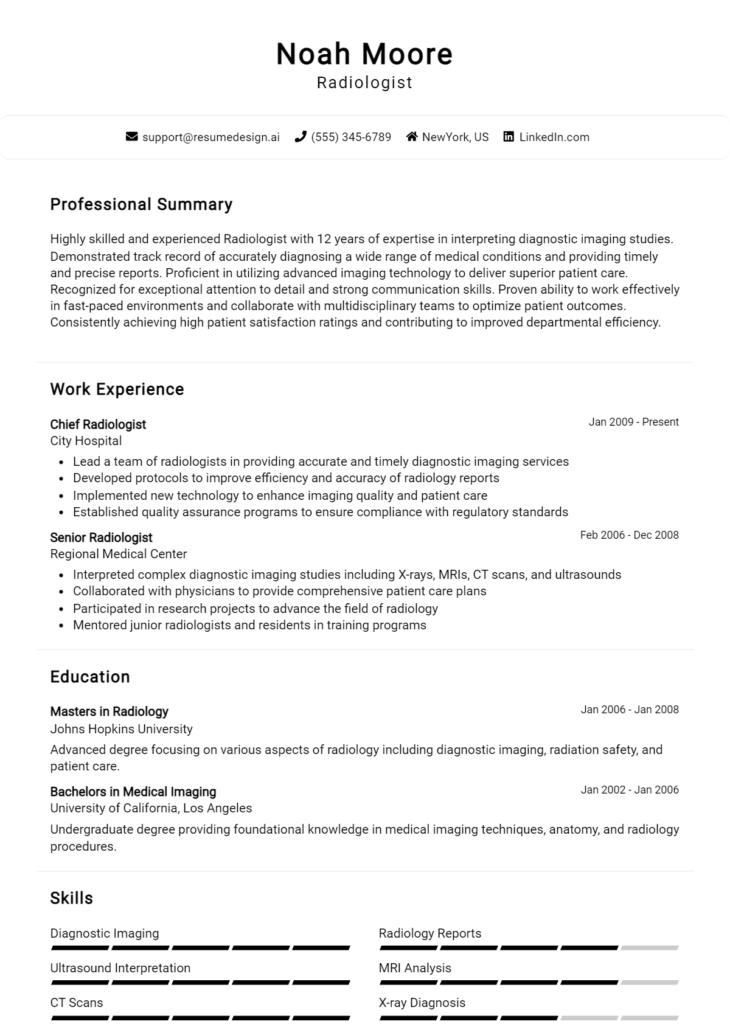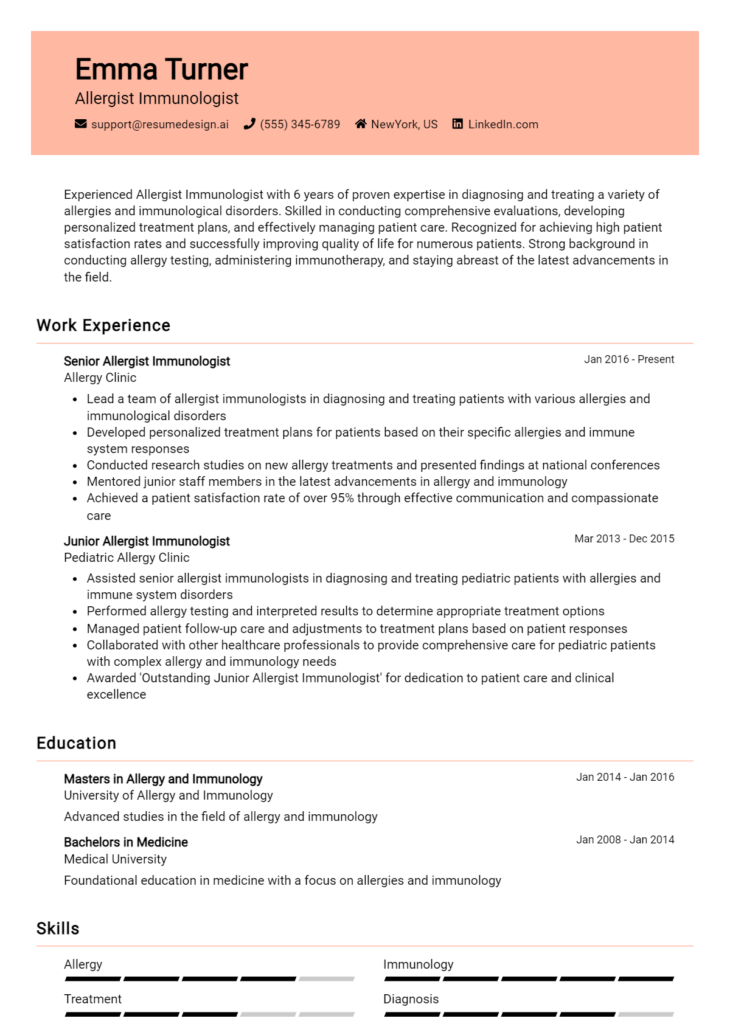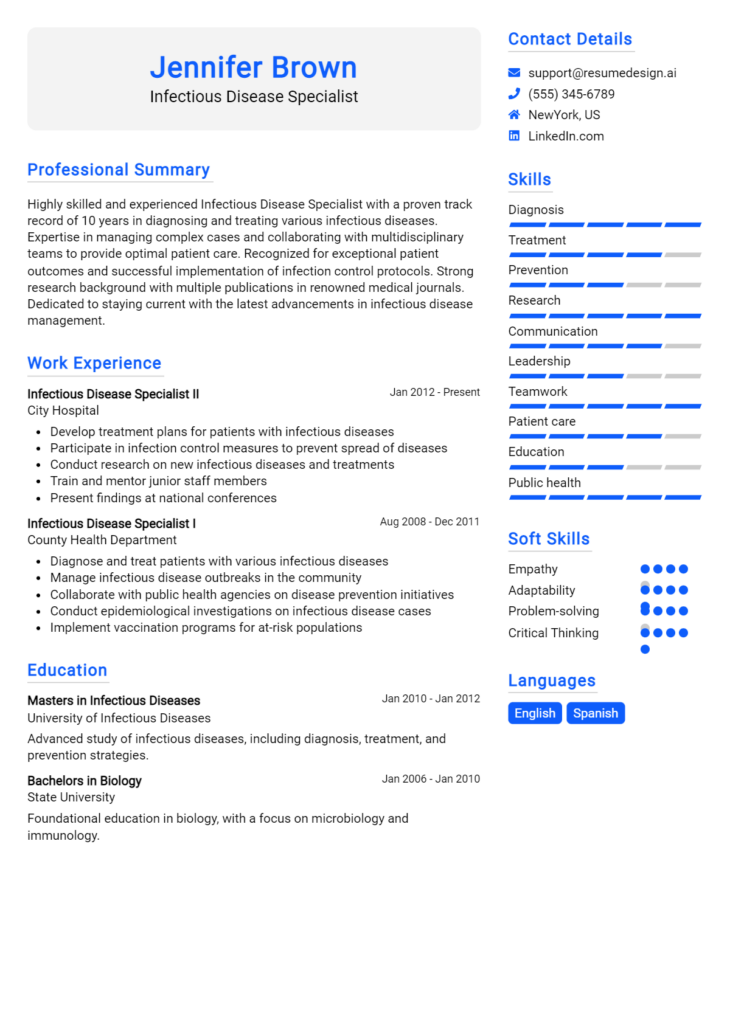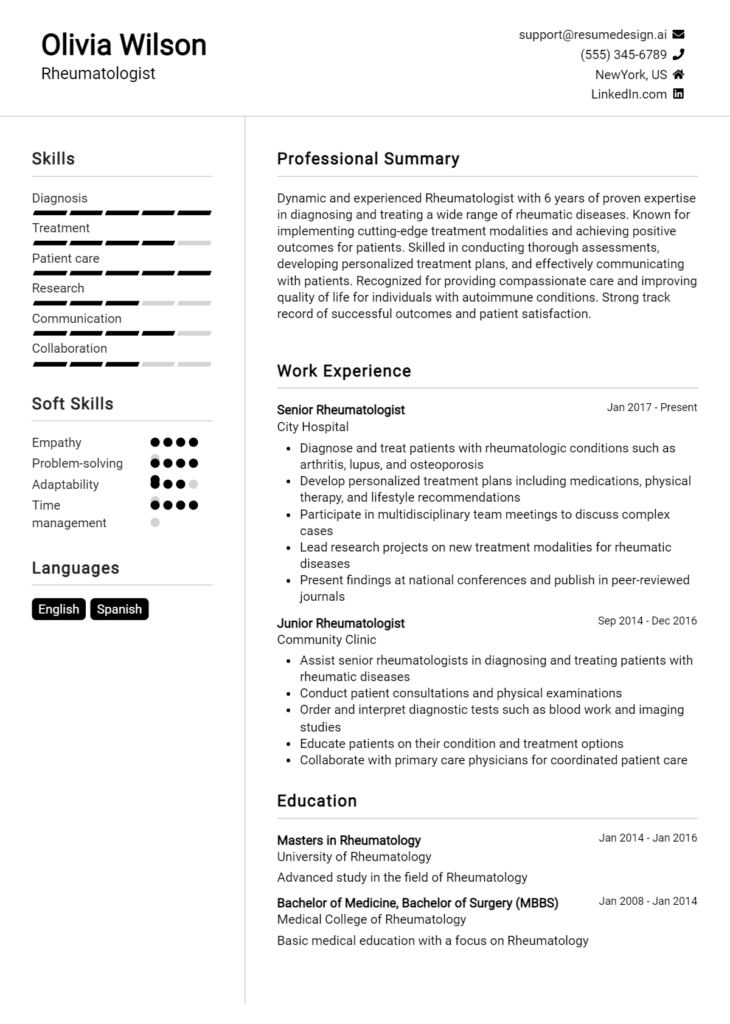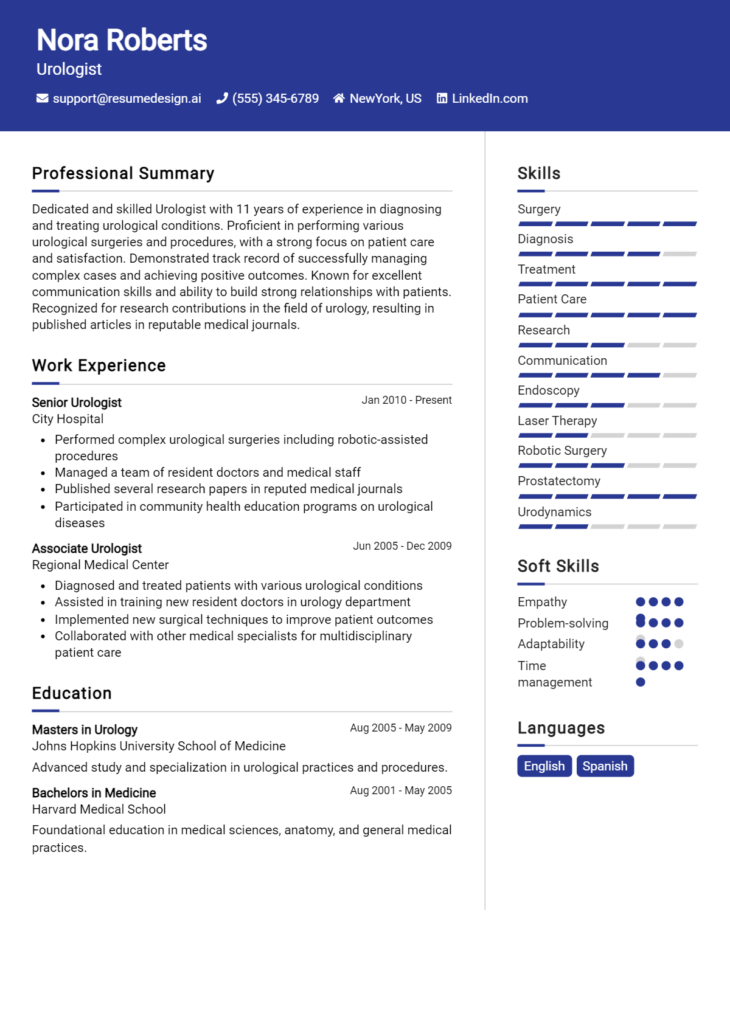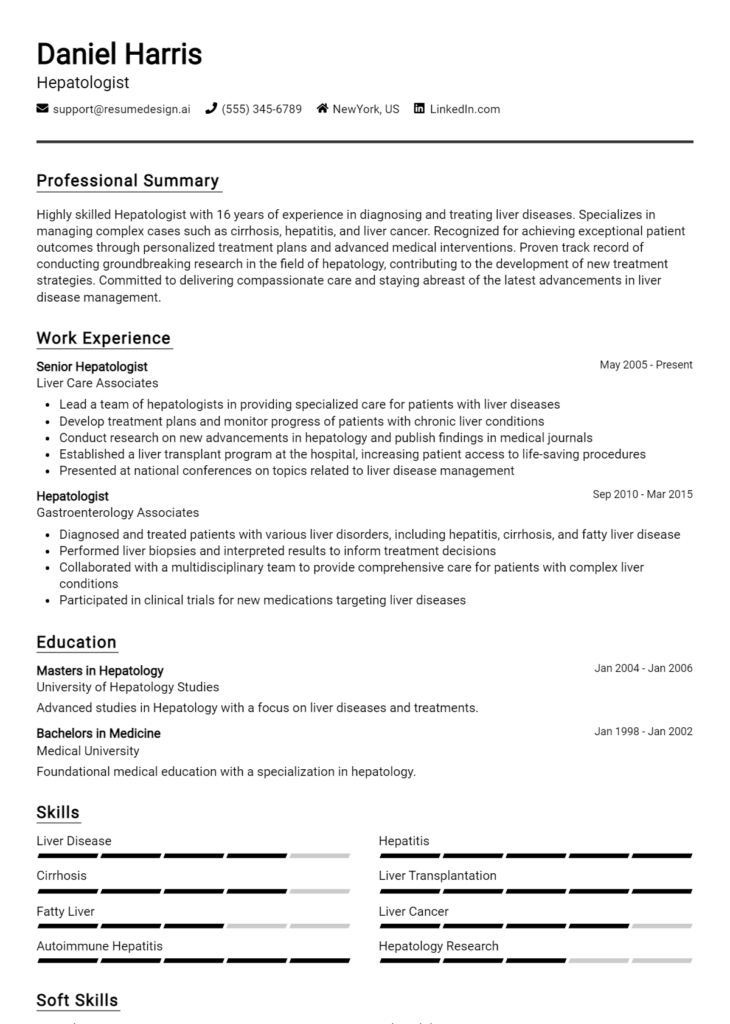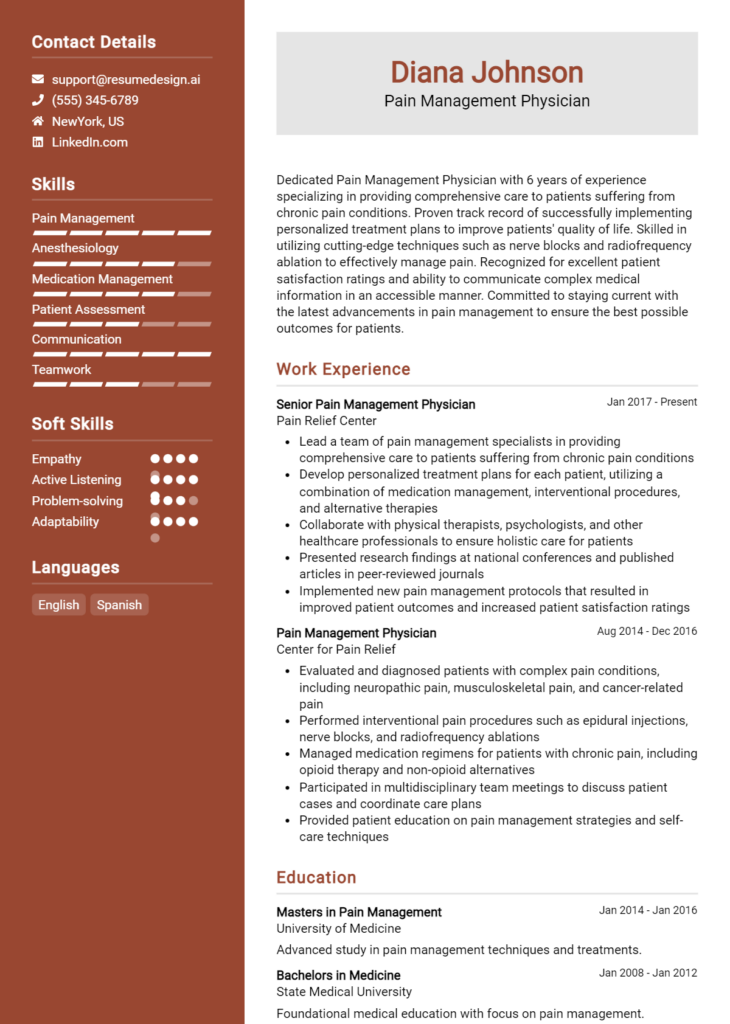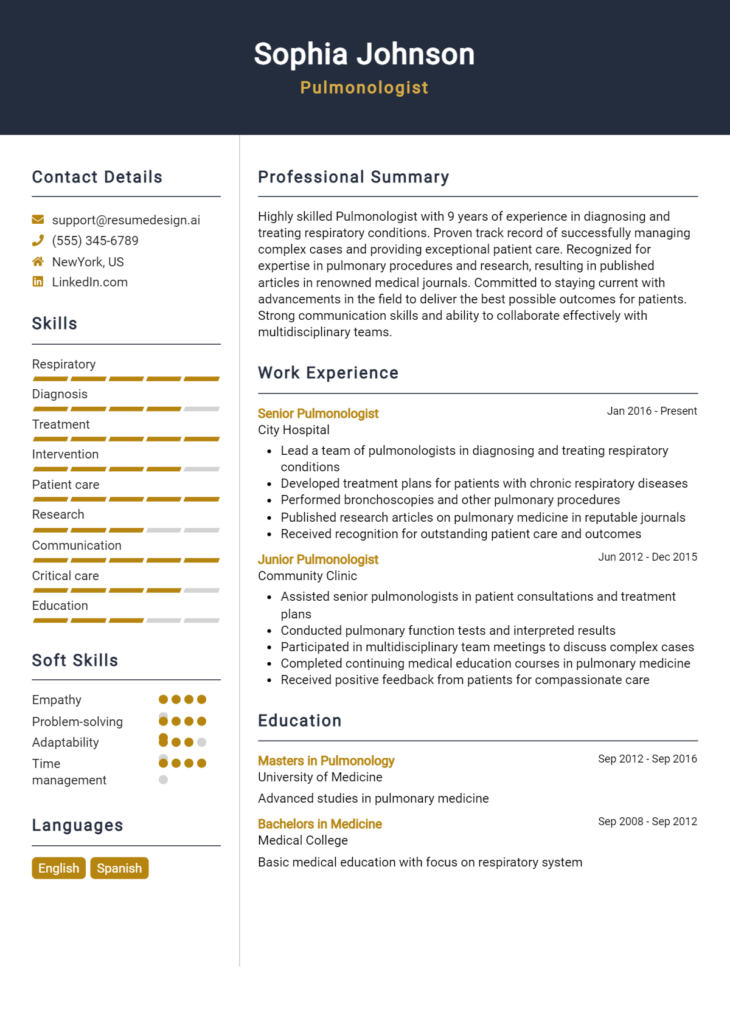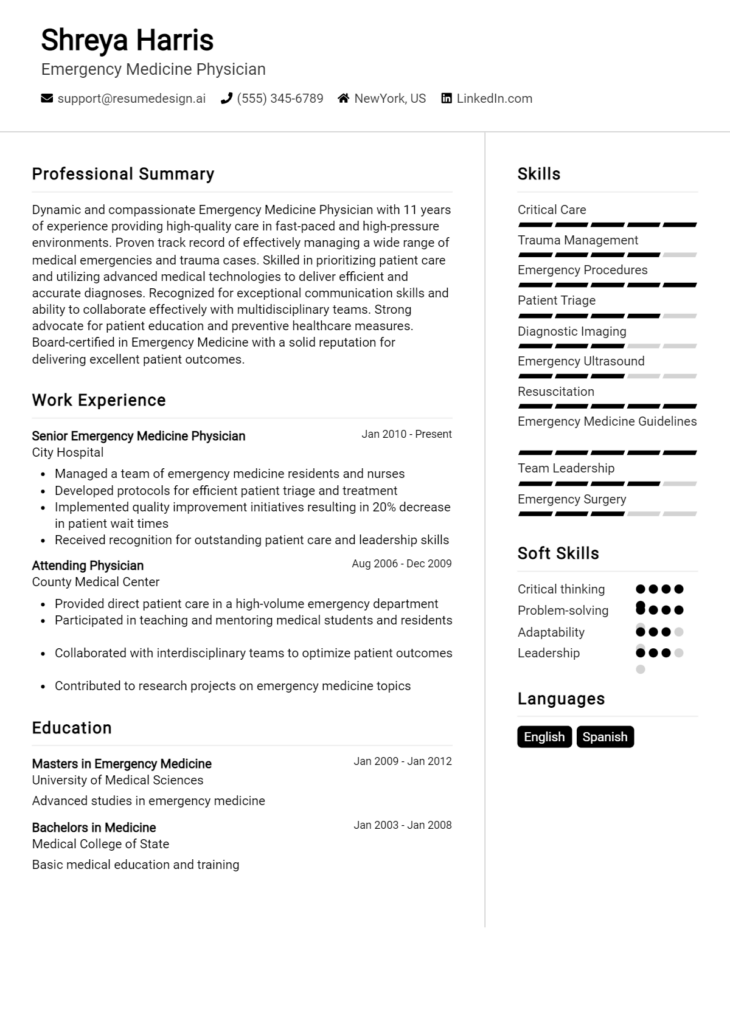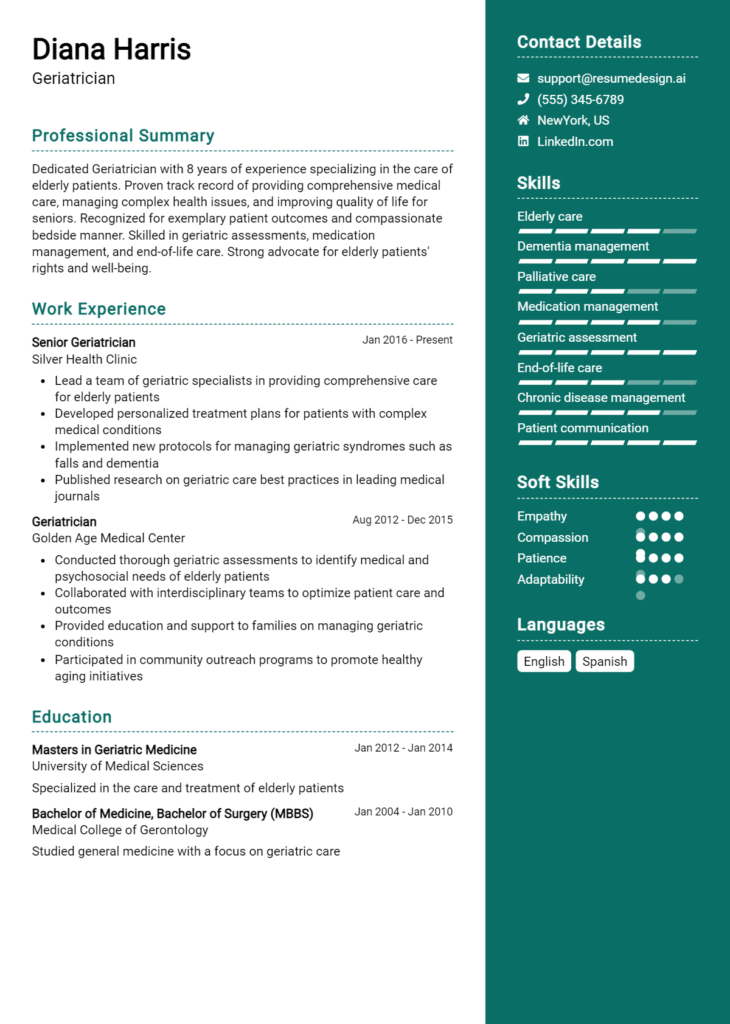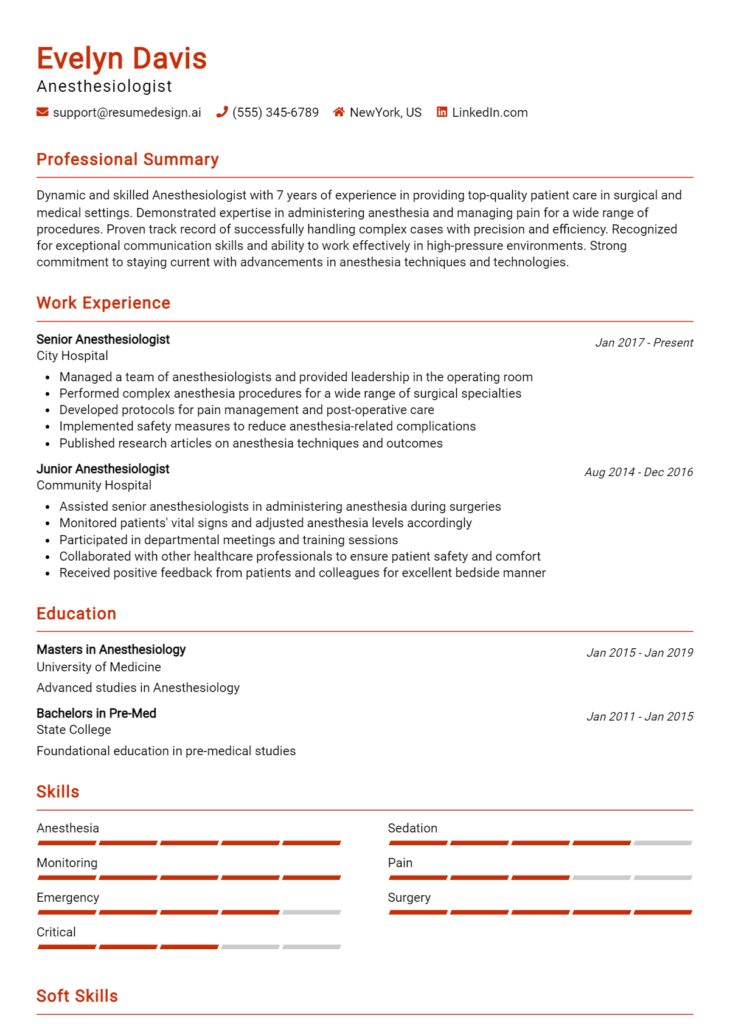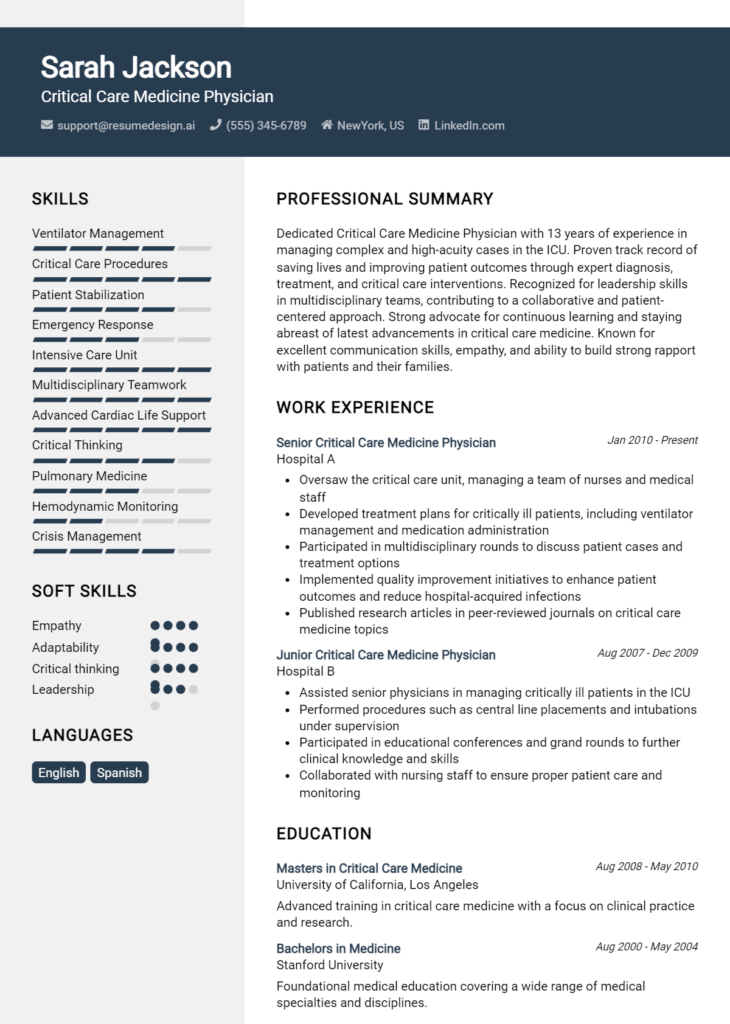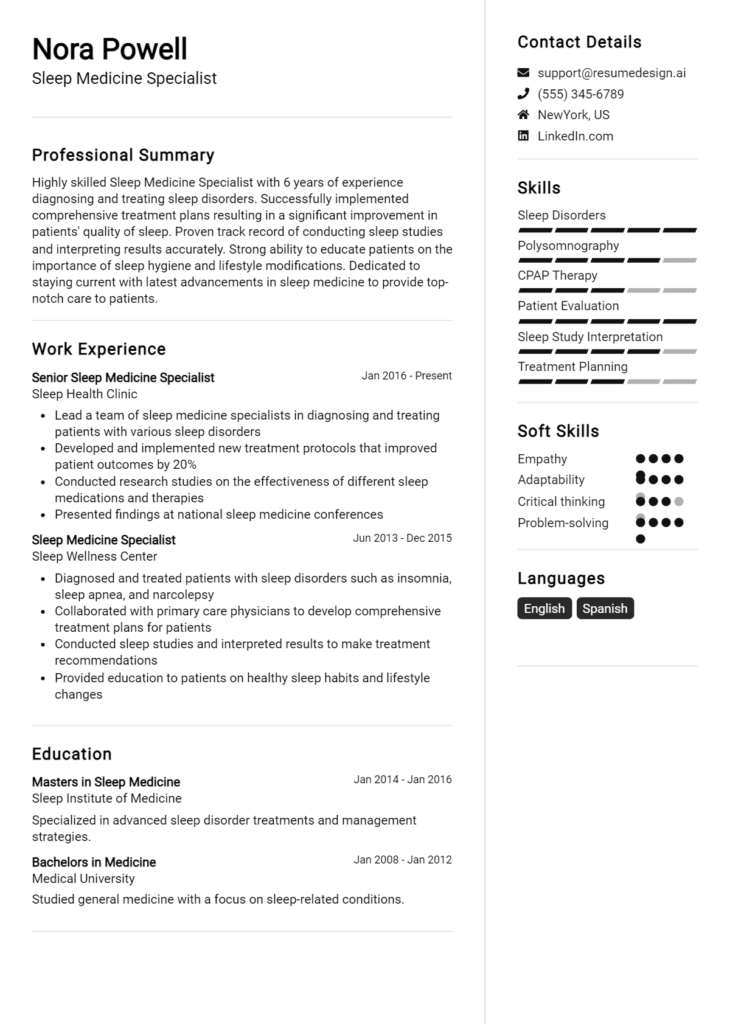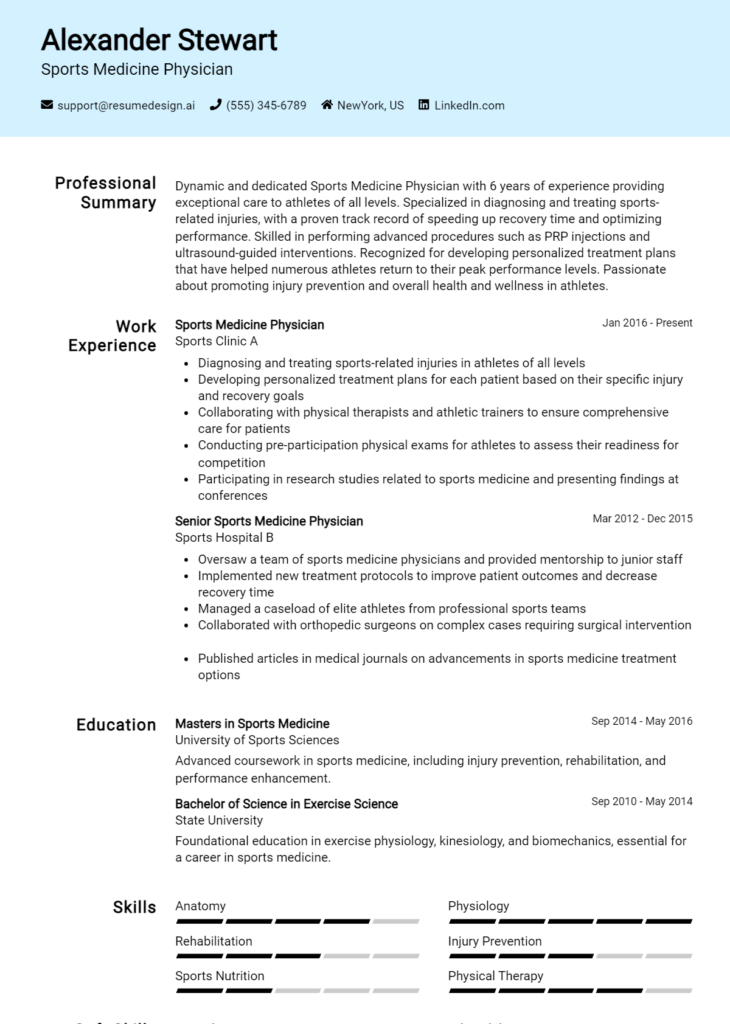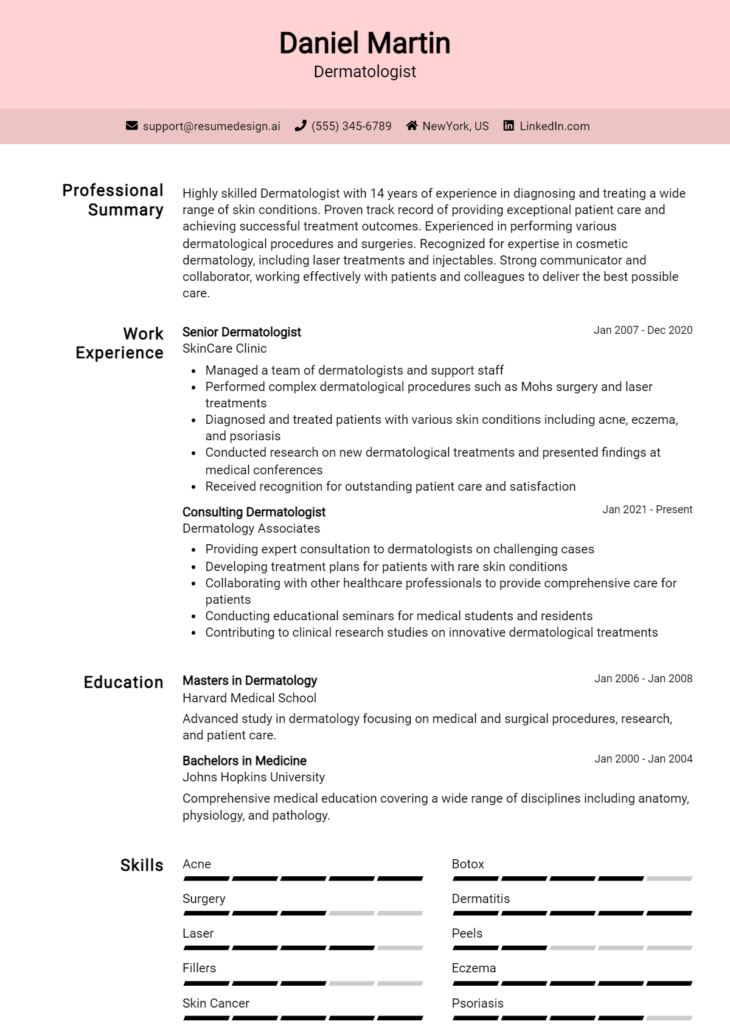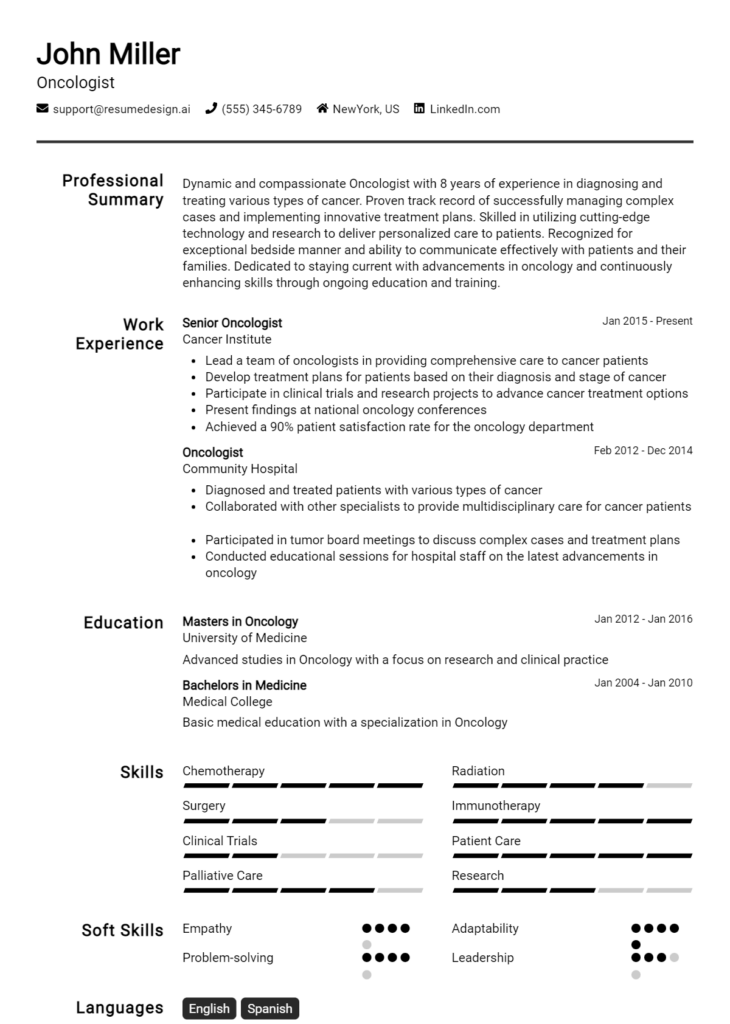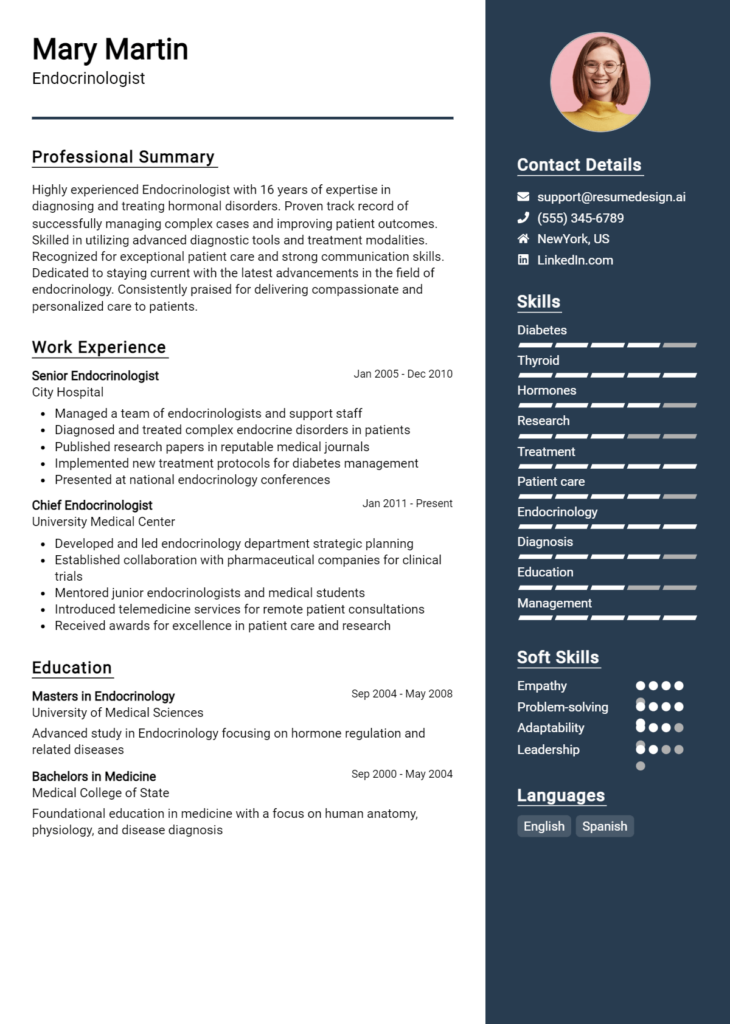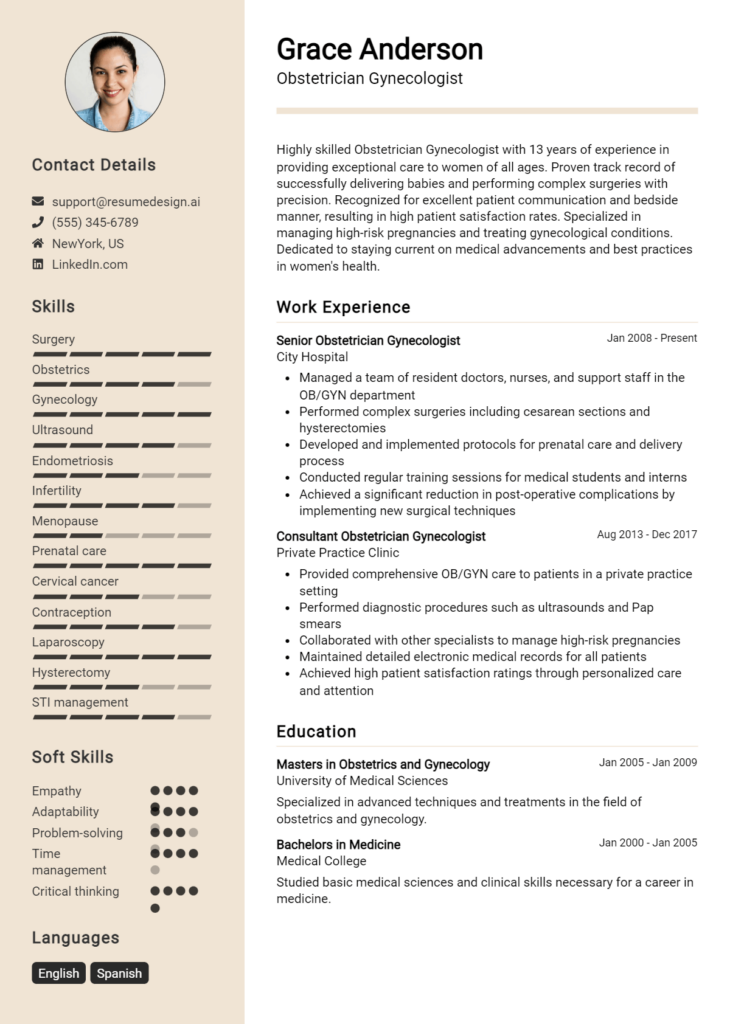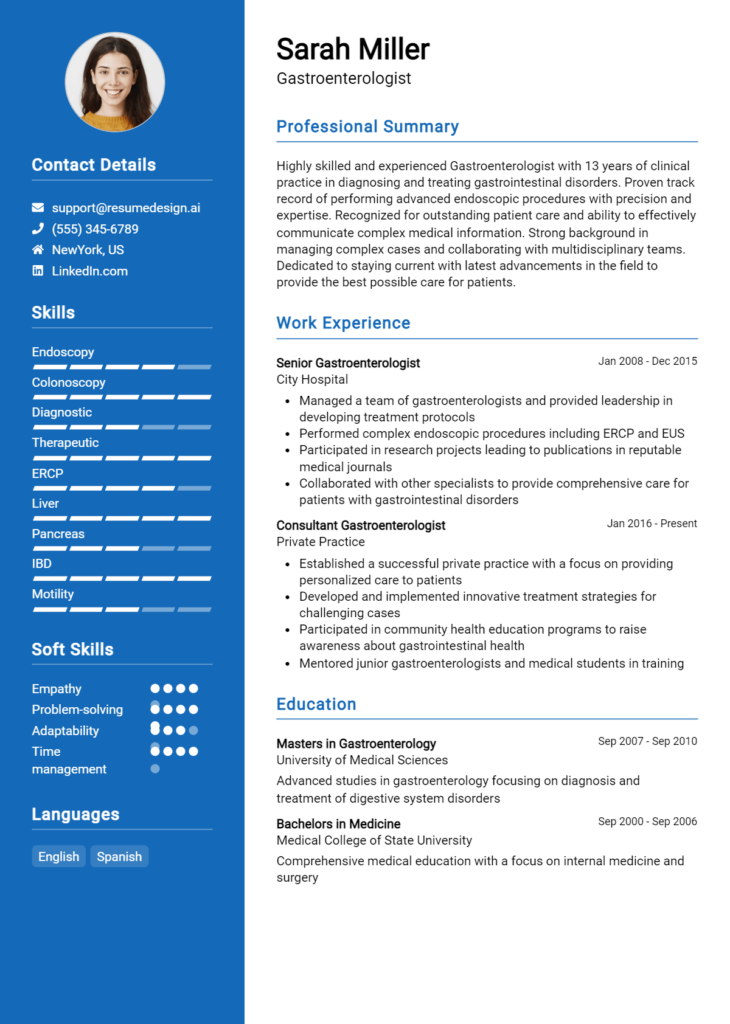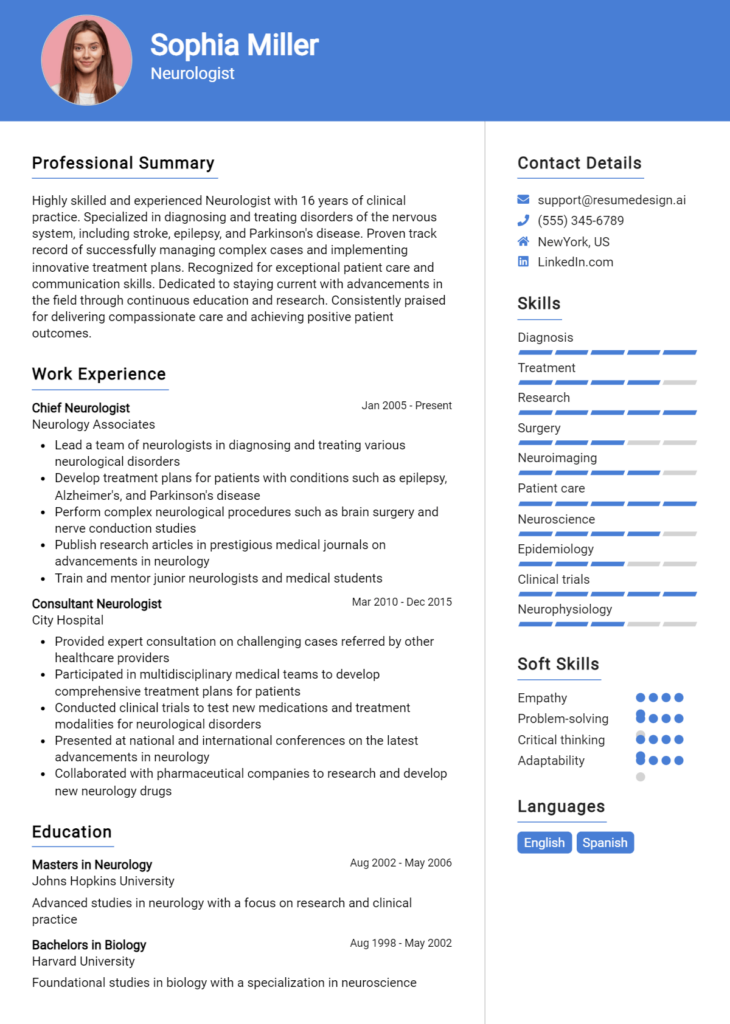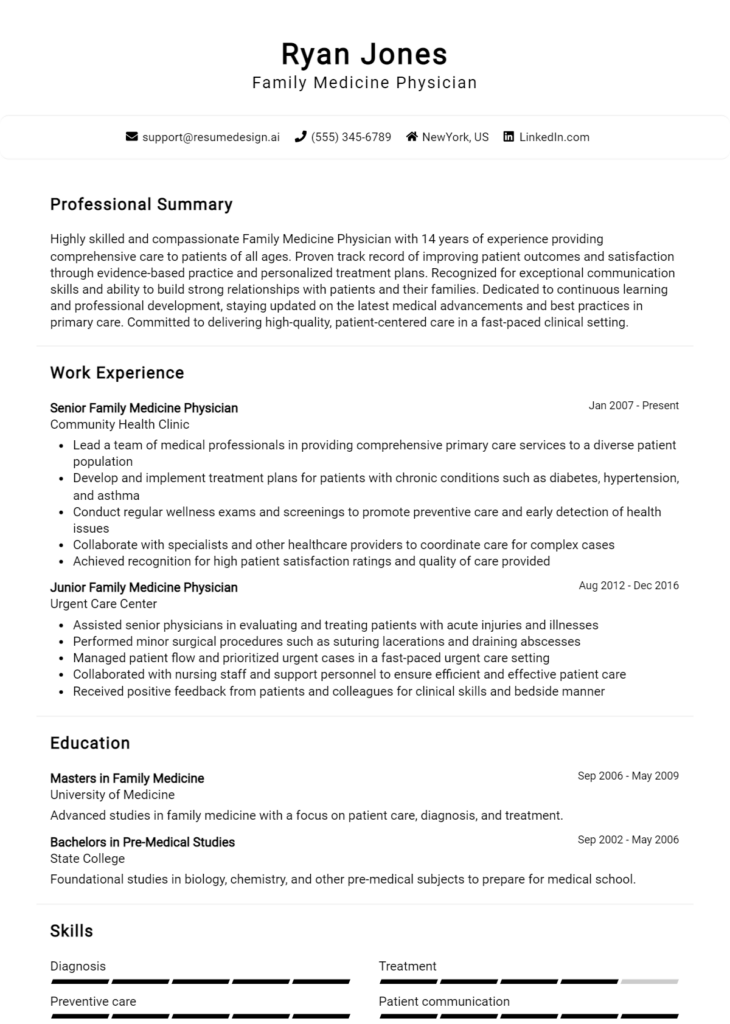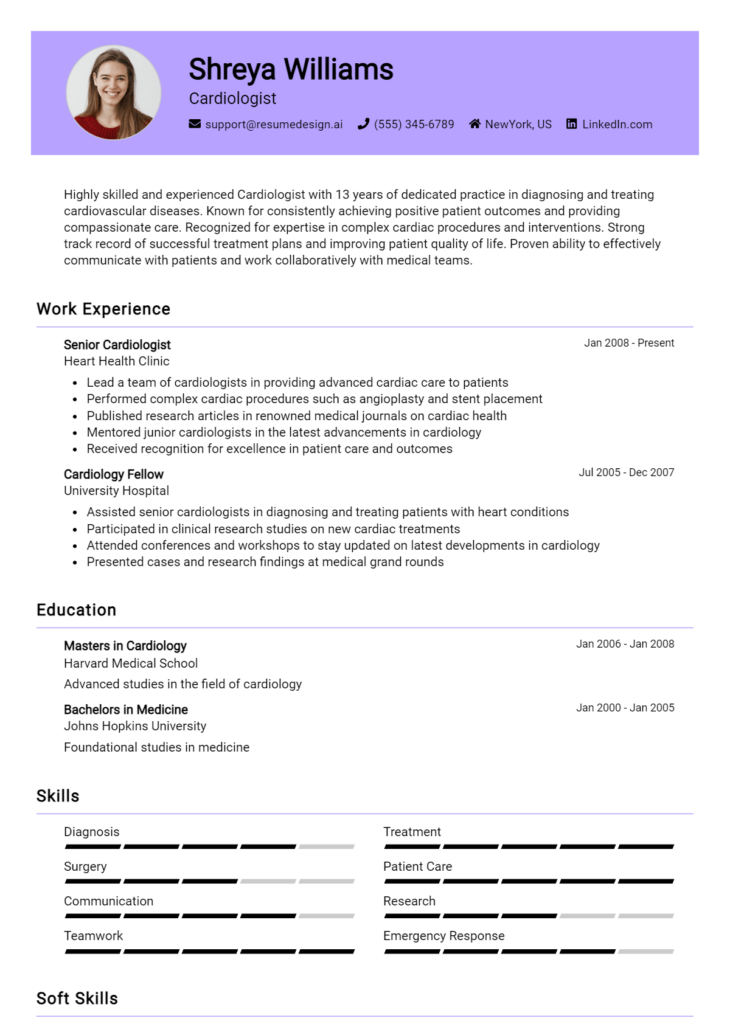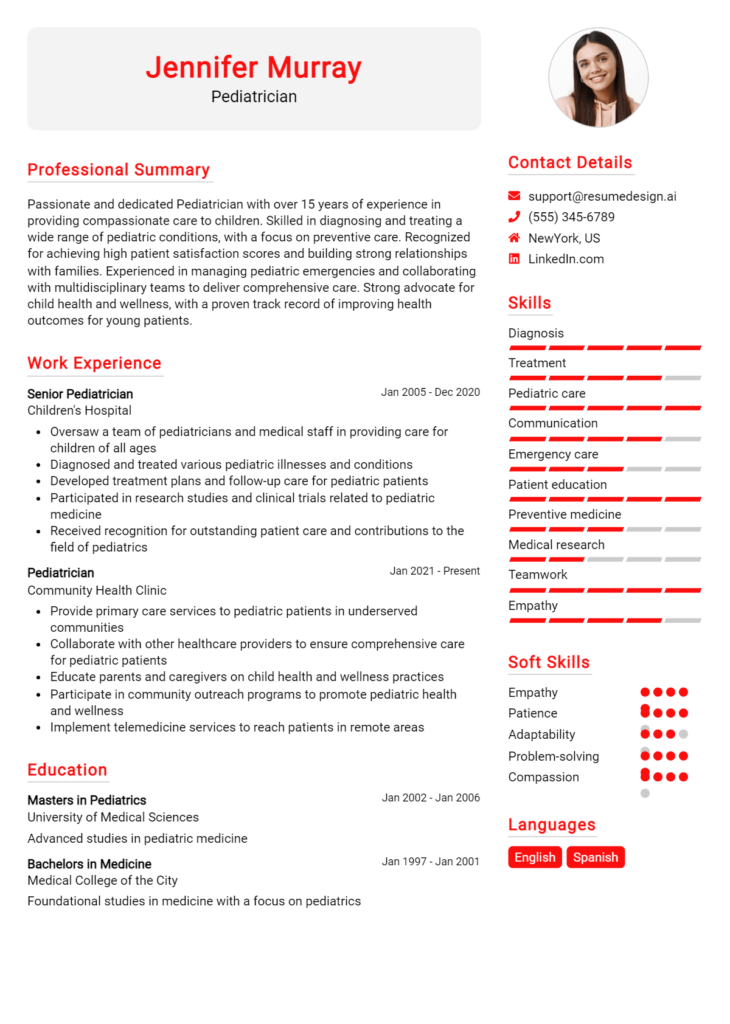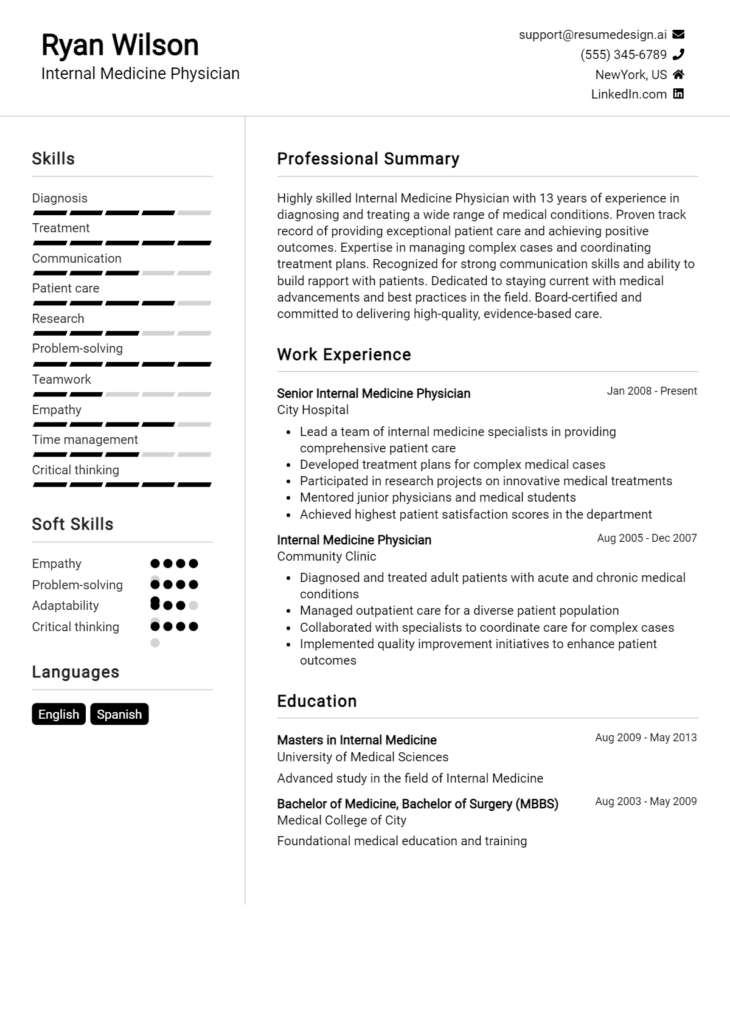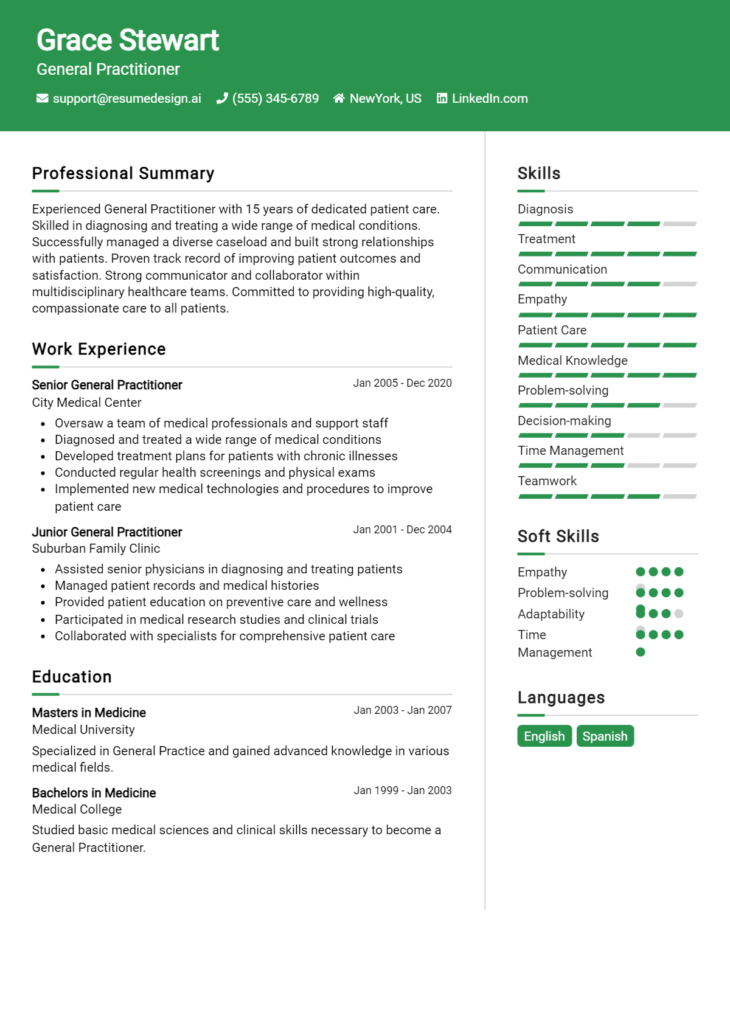Hematologist Core Responsibilities
A Hematologist plays a critical role in diagnosing and treating blood disorders, requiring a blend of technical expertise, operational acumen, and strong problem-solving skills. They collaborate across departments, working with oncologists, pathologists, and nursing staff to ensure comprehensive patient care. These professionals must possess analytical abilities to interpret complex lab results and develop effective treatment plans. A well-structured resume that highlights these qualifications can significantly contribute to the organization's goals by attracting top talent in this specialized field.
Common Responsibilities Listed on Hematologist Resume
- Diagnosing and treating blood-related diseases and disorders.
- Interpreting laboratory tests and results.
- Developing individualized treatment plans for patients.
- Conducting bone marrow examinations and biopsies.
- Collaborating with multidisciplinary teams for patient care.
- Staying updated on the latest research and treatment options.
- Educating patients and families about blood disorders.
- Participating in clinical trials and research studies.
- Providing consultations for complex cases.
- Monitoring treatment efficacy and making necessary adjustments.
- Maintaining accurate medical records and documentation.
- Adhering to safety and regulatory guidelines in practice.
High-Level Resume Tips for Hematologist Professionals
In the competitive field of hematology, a well-crafted resume is not just a document; it is your first and often only chance to make a lasting impression on potential employers. As a hematologist, your resume must effectively showcase your medical expertise, specialized skills, and significant achievements in the field of blood disorders. It serves as a powerful marketing tool that can open doors to interviews and new opportunities. This guide will provide practical and actionable resume tips specifically tailored for hematologist professionals, ensuring that your application stands out in a crowded job market.
Top Resume Tips for Hematologist Professionals
- Tailor your resume to the job description by incorporating relevant keywords and phrases specific to the hematology position.
- Highlight your clinical experience in hematology, including internships, residencies, and fellowships related to blood disorders.
- Quantify your achievements by including metrics, such as the number of successful treatments or research contributions that demonstrate your impact in the field.
- Showcase your proficiency in industry-specific skills, including laboratory techniques and knowledge of hematological diseases.
- Include any certifications, such as board certification in hematology, to validate your qualifications and expertise.
- Highlight your involvement in relevant research projects, publications, or presentations that showcase your commitment to advancing hematology.
- Emphasize your ability to work collaboratively within a multidisciplinary team, showcasing your interpersonal and communication skills.
- Keep your resume concise and focused, ideally one to two pages, ensuring that only relevant information is included.
- Utilize a clean, professional format with clear headings and bullet points to enhance readability and appeal.
- Proofread your resume thoroughly to eliminate any errors in spelling, grammar, or formatting, as attention to detail is crucial in the medical field.
By implementing these targeted tips, you can significantly enhance your resume and increase your chances of landing your desired role in the hematology field. A polished and tailored resume not only reflects your capabilities but also conveys your professionalism and dedication, making you a strong candidate in the eyes of potential employers.
Why Resume Headlines & Titles are Important for Hematologist
In the competitive field of hematology, a well-crafted resume headline or title is crucial for making a strong first impression. This succinct phrase serves as the candidate's first opportunity to capture the attention of hiring managers, summarizing their key qualifications and professional identity in a single impactful statement. A strong headline should be concise, relevant, and directly related to the specific job being applied for, allowing the candidate to stand out in a sea of applications. By effectively highlighting their expertise and unique qualifications, hematologists can enhance their chances of securing interviews and advancing in their careers.
Best Practices for Crafting Resume Headlines for Hematologist
- Keep it concise: Aim for a headline that is no longer than 10-12 words.
- Be specific: Use terminology relevant to the hematology field to demonstrate expertise.
- Highlight key qualifications: Focus on the most important skills or experiences.
- Use action-oriented language: Strong verbs can convey confidence and proactivity.
- Tailor to the job description: Align your headline with the specific role you are applying for.
- Include relevant certifications or credentials: This adds credibility and authority.
- Avoid jargon: Use clear language that is easily understood by hiring managers.
- Make it impactful: Consider using metrics or accomplishments to illustrate success.
Example Resume Headlines for Hematologist
Strong Resume Headlines
Board-Certified Hematologist with 10+ Years of Clinical Experience
Expert in Hematologic Disorders with a Track Record of Successful Interventions
Dedicated Hematologist Specializing in Innovative Treatment Protocols
Hematology Specialist with Proven Leadership in Multidisciplinary Healthcare Teams
Weak Resume Headlines
Hematologist Seeking Job
Experienced Doctor in Medicine
Looking for Opportunities in Hematology
The strong headlines are effective because they clearly communicate specific qualifications and areas of expertise, instantly positioning the candidate as a strong contender for the role. They utilize impactful language and relevant details that resonate with hiring managers. In contrast, the weak headlines fail to impress due to their vagueness and lack of specificity. These generic statements do not convey any unique skills or experiences, making it difficult for hiring managers to see the value the candidate brings to the table.
Writing an Exceptional Hematologist Resume Summary
Writing a compelling resume summary is crucial for a Hematologist, as it serves as the first impression for hiring managers. A well-crafted summary succinctly encapsulates your key skills, relevant experience, and notable accomplishments, immediately capturing attention and setting the tone for the rest of the resume. Given the specialized nature of the field, a strong summary should be concise and impactful, tailored specifically to the job for which you are applying, allowing you to stand out in a competitive job market.
Best Practices for Writing a Hematologist Resume Summary
- Quantify Achievements: Use numbers to highlight your impact, such as the number of patients treated or percentage improvement in outcomes.
- Focus on Skills: Emphasize specific skills relevant to hematology, such as diagnostic expertise, treatment planning, and patient management.
- Tailor for the Job Description: Align your summary with the requirements and keywords in the job posting to demonstrate your suitability.
- Highlight Relevant Experience: Summarize your most pertinent positions, emphasizing your role in clinical settings or research.
- Be Concise: Keep your summary brief, ideally 2-4 sentences, to ensure it remains impactful without overwhelming the reader.
- Use Action Verbs: Start with strong action verbs to convey confidence and professionalism in your achievements.
- Showcase Soft Skills: Include interpersonal skills such as communication and teamwork that are essential for patient care.
- Keep it Positive: Maintain an optimistic tone that reflects your passion for hematology and commitment to patient care.
Example Hematologist Resume Summaries
Strong Resume Summaries
Results-driven Hematologist with over 10 years of clinical experience, successfully managing a diverse patient population and achieving a 95% patient satisfaction rate. Expertise in diagnosing and treating hematological disorders, with a proven track record of improving treatment outcomes by 30% through innovative therapeutic approaches.
Dedicated Hematologist with a focus on research and clinical trials, contributing to the development of new therapies that have improved patient survival rates by 25%. Skilled in patient education and multidisciplinary collaboration, with a commitment to advancing hematology practice.
Compassionate and detail-oriented Hematologist, recognized for leading a team that reduced patient wait times by 40% while maintaining a high standard of care. Proven skills in managing complex cases and developing individualized treatment plans for patients with rare blood disorders.
Weak Resume Summaries
Hematologist with experience in the medical field looking for a position. I have worked with patients and have some research skills.
Dedicated medical professional with a background in hematology. I am seeking a job where I can apply my skills and help patients.
The strong resume summaries are effective because they provide specific details such as years of experience, quantifiable achievements, and specialized skills pertinent to the role of a Hematologist. They demonstrate a clear impact on patient care and outcomes, making them relevant and compelling. In contrast, the weak resume summaries lack specificity and measurable results, making them generic and less engaging, which could fail to capture the attention of hiring managers.
Work Experience Section for Hematologist Resume
The work experience section of a Hematologist resume is crucial as it provides a comprehensive overview of the candidate's professional background and capabilities in the field of hematology. This section not only highlights technical skills related to diagnosing and treating blood disorders, but also showcases the ability to manage multidisciplinary teams and deliver high-quality patient care. By quantifying achievements and aligning work experience with industry standards, candidates can effectively demonstrate their impact in previous roles, making a compelling case for their suitability for prospective positions.
Best Practices for Hematologist Work Experience
- Use specific medical terminology and techniques relevant to hematology to demonstrate expertise.
- Quantify achievements, such as the number of patients treated, success rates, or improvements in patient outcomes.
- Highlight leadership roles, including team management, mentorship, and training of junior staff.
- Incorporate details about collaborative projects with other healthcare professionals to demonstrate teamwork skills.
- Tailor work experience descriptions to align with the requirements of the job you are applying for.
- Focus on outcomes by showcasing how your contributions led to improvements in clinical practices or patient satisfaction.
- Utilize action verbs to start each bullet point to convey a sense of proactivity and leadership.
- Keep descriptions concise and relevant, ensuring clarity and focus on the most impactful experiences.
Example Work Experiences for Hematologist
Strong Experiences
- Led a multidisciplinary team in the implementation of a new bone marrow transplant protocol, increasing patient survival rates by 30% over two years.
- Managed and treated over 500 patients with various hematological disorders, achieving a 90% satisfaction rate based on patient feedback surveys.
- Conducted groundbreaking research that resulted in a novel treatment for sickle cell disease, published in a leading medical journal and adopted by five major hospitals.
- Collaborated with oncologists and pathologists to develop an integrated care pathway, reducing treatment delays by 25% and improving overall patient outcomes.
Weak Experiences
- Worked with patients in a clinical setting.
- Assisted in various hematology tasks as needed.
- Participated in team meetings and discussions.
- Contributed to standard procedures in the department.
The examples of strong experiences are considered effective because they provide specific, quantifiable outcomes that demonstrate the candidate's impact and technical expertise in hematology. They highlight leadership, collaboration, and significant achievements that align with industry standards. In contrast, the weak experiences lack detail and do not offer measurable results or indicate a substantial contribution to the field, making them less compelling to potential employers.
Education and Certifications Section for Hematologist Resume
The education and certifications section of a Hematologist resume plays a crucial role in establishing the candidate's qualifications and expertise in the field of hematology. This section not only showcases the candidate's academic background, including degrees from accredited institutions, but also highlights industry-relevant certifications that demonstrate specialized knowledge and skills. Furthermore, continuous learning efforts, such as relevant coursework and specialized training, reflect the candidate's commitment to professional development and staying abreast of advancements in the field. By providing a comprehensive overview of their educational credentials, candidates can greatly enhance their credibility and alignment with the specific requirements of the job role.
Best Practices for Hematologist Education and Certifications
- Include only relevant degrees and certifications that pertain to hematology.
- List your educational qualifications in reverse chronological order, starting with the most recent.
- Highlight advanced degrees (e.g., MD, PhD) and specialized training or fellowships in hematology.
- Incorporate industry-recognized certifications, such as Board Certification in Hematology.
- Be specific about coursework that relates directly to hematology, oncology, or related fields.
- Use clear and professional formatting to enhance readability and presentation.
- Regularly update your education and certifications section to reflect any new qualifications.
- Consider including professional development activities, such as workshops and seminars, that demonstrate ongoing education.
Example Education and Certifications for Hematologist
Strong Examples
- Doctor of Medicine (MD), Harvard Medical School, 2015
- Board Certified in Hematology, American Board of Internal Medicine, 2017
- Fellowship in Hematology and Oncology, Johns Hopkins Hospital, 2018
- Advanced Clinical Training in Hematological Disorders, University of California, San Francisco, 2019
Weak Examples
- Bachelor of Arts in English Literature, University of Michigan, 2010
- Certification in Basic Life Support (BLS), 2015 (not specific to hematology)
- Online Course in Creative Writing, Coursera, 2020
- High School Diploma, Lincoln High School, 2006
The strong examples are considered relevant as they include advanced medical degrees and certifications that are directly applicable to the role of a Hematologist, demonstrating both educational achievement and specialized expertise. In contrast, the weak examples include qualifications that are either irrelevant to hematology or do not reflect a depth of knowledge required for the position, such as a degree in an unrelated field or generic certifications lacking specialization.
Top Skills & Keywords for Hematologist Resume
A well-crafted resume is essential for a hematologist, as it highlights the specific skills and expertise needed in this specialized field of medicine. The role of a hematologist involves diagnosing and treating blood disorders, which requires a blend of both hard and soft skills. Emphasizing these skills on a resume not only showcases a candidate's qualifications but also demonstrates their ability to connect with patients and collaborate with other healthcare professionals. Successful hematologists must be adept in clinical practices and patient management, making the inclusion of relevant skills crucial for standing out in a competitive job market. For more information on how to present your skills and work experience, continue reading.
Top Hard & Soft Skills for Hematologist
Soft Skills
- Empathy
- Communication
- Team collaboration
- Problem-solving
- Critical thinking
- Attention to detail
- Time management
- Active listening
- Adaptability
- Patient advocacy
- Interpersonal skills
- Conflict resolution
- Compassion
- Leadership
- Cultural competence
- Stress management
- Decision-making
Hard Skills
- Blood disorder diagnostics
- Bone marrow biopsy techniques
- Laboratory analysis
- Patient management systems
- Knowledge of hematopathology
- Chemotherapy administration
- Clinical research methodologies
- Blood transfusion protocols
- Interpretation of laboratory results
- Knowledge of pharmacology
- Proficiency in electronic health records (EHR)
- Understanding of immunology
- Familiarity with clinical trials
- Data analysis and reporting
- Regulatory compliance
- Advanced life support (ALS)
- Statistical analysis in medical research
Stand Out with a Winning Hematologist Cover Letter
I am writing to express my interest in the Hematologist position at [Hospital/Clinic Name] as advertised on [Job Board/Website]. With my comprehensive training in hematology and a strong commitment to patient care, I am excited about the opportunity to contribute to your esteemed team. My experience spans over [number of years] years, during which I have honed my skills in diagnosing and treating a wide array of blood disorders, including anemia, clotting disorders, and malignancies like leukemia and lymphoma. I am particularly drawn to [specific aspect of the hospital/clinic, e.g., its commitment to research, patient-centered approach, etc.], which aligns with my professional values and aspirations.
Throughout my career, I have been dedicated to providing high-quality care tailored to the individual needs of my patients. My role at [Previous Institution] involved not only direct patient care but also collaboration with multidisciplinary teams to formulate comprehensive treatment plans. I take pride in my ability to communicate complex medical information in an accessible manner, ensuring that patients and their families feel informed and empowered throughout their treatment journey. Additionally, I have conducted numerous clinical trials aimed at improving therapeutic options for patients with hematological malignancies, reflecting my commitment to advancing the field through research.
I am particularly impressed by [Hospital/Clinic Name]'s emphasis on continuing education and professional development. I am eager to contribute my expertise in hematology while also engaging in ongoing learning and collaboration with fellow professionals. I am confident that my background, combined with my proactive approach to patient care and my dedication to advancing the field, makes me a strong candidate for this role. I look forward to the opportunity to discuss how my skills and experiences align with the needs of your team and to contribute to the exceptional care provided at [Hospital/Clinic Name]. Thank you for considering my application.
Common Mistakes to Avoid in a Hematologist Resume
When crafting a resume as a hematologist, it's crucial to present your qualifications and experience effectively. However, many candidates make common mistakes that can hinder their chances of securing an interview. Avoiding these pitfalls can significantly enhance your resume's effectiveness and make a lasting impression on potential employers. Here are some common mistakes to watch out for:
Overly Complex Language: Using jargon or complicated terminology can confuse hiring managers. Aim for clear, concise language that communicates your expertise without alienating your audience.
Neglecting Relevant Experience: Failing to highlight specific experiences related to hematology can lead to missed opportunities. Ensure that your resume emphasizes relevant clinical experience, research, and specialized training.
Inconsistent Formatting: A disorganized resume can detract from your professionalism. Use consistent fonts, headings, and bullet points to create a clean and easy-to-read layout.
Ignoring Keywords: Many employers use Applicant Tracking Systems (ATS) to filter resumes. Not including relevant keywords from the job description may result in your resume being overlooked.
Lack of Quantifiable Achievements: Stating duties without showcasing accomplishments can leave your resume feeling flat. Include metrics and specific outcomes that demonstrate your impact in previous roles.
Not Tailoring the Resume: Sending a generic resume for every application can diminish your chances. Customize your resume for each position by aligning your skills and experiences with the specific job requirements.
Failure to Update: Outdated resumes can give the impression that you're not actively engaged in your field. Regularly update your resume with new certifications, continuing education, and recent experiences.
Ignoring Soft Skills: While technical skills are vital for a hematologist, soft skills such as communication and empathy are equally important. Highlighting these traits can set you apart from other candidates.
Conclusion
As a hematologist, your expertise in diagnosing and treating blood disorders is vital to patient care. Throughout this article, we have explored the essential skills and qualifications that define an effective hematologist, including a deep understanding of hematological diseases, proficiency in interpreting lab results, and the ability to communicate complex information to patients and their families. We also discussed the importance of continuous education and staying current with advancements in the field to provide the best possible care.
In conclusion, an impressive resume is crucial for showcasing your skills and experience as a hematologist. If you’re looking to enhance your resume to reflect your qualifications effectively, now is the time to take action. We encourage you to review your hematologist resume and consider utilizing available resources to make it stand out. Explore the wide range of resume templates, use the convenient resume builder to create a polished document, check out resume examples for inspiration, and don’t forget to craft a compelling cover letter with our cover letter templates. Invest in your professional future today!

